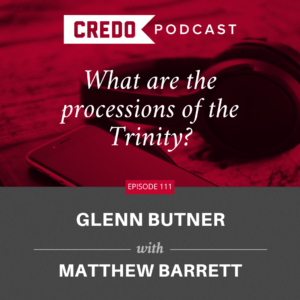Show Notes
 What are eternal processions? The language of “processions” may be foreign to some today, but the Great Tradition capitalized on this language to describe the Trinity and keep heresy at bay. From the church fathers to the medieval and Protestant scholastics, theologians used the language of procession to explain how the Son is eternally begotten from the Father and the how the Spirit is eternally spirated from the Father and the Son. Critical as it is to distinguish the Son’s procession from the Father and the Spirit’s procession from the Father and the Son, how do we do so without forfeiting the simplicity of the Trinity?
What are eternal processions? The language of “processions” may be foreign to some today, but the Great Tradition capitalized on this language to describe the Trinity and keep heresy at bay. From the church fathers to the medieval and Protestant scholastics, theologians used the language of procession to explain how the Son is eternally begotten from the Father and the how the Spirit is eternally spirated from the Father and the Son. Critical as it is to distinguish the Son’s procession from the Father and the Spirit’s procession from the Father and the Son, how do we do so without forfeiting the simplicity of the Trinity?
Evangelicalism has been marked by its tendency to compromise the eternal processions of the Trinity. Yet these processions in the Trinity remain vital to distinguishing the persons and protecting their consubstantiality with one another. In this episode, Glenn Butner joins Matthew Barrett to discuss the mystery of processions in the Trinity and why processions are so essential for Christian orthodoxy today.
Glenn Butner, Jr. (M.Div., Duke Divinity School, Ph.D., Marquette University) is assistant professor of theology and Christian ministry at Sterling College in Sterling, KS. He is the author of The Son who Learned Obedience: A Theological Case Against the Eternal Submission of the Son (Pickwick, 2018) and Trinitarian Dogmatics: Exploring the Grammar of the Christian Doctrine of God (Baker, 2022).
Matthew Barrett is the author of Simply Trinity: The Unmanipulated Father, Son, and Holy Spirit (Baker). He is the founder and executive editor of Credo Magazine and host of the Credo podcast. He is associate professor of Christian theology at Midwestern Baptist Theological Seminary. He is currently writing a Systematic Theology with Baker Academic.
Photo credit: Solo Orange, by Carlo A
